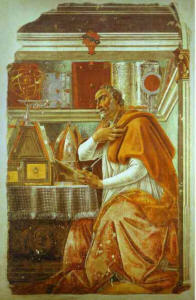Augustine of Hippo
 St.
Augustine was born at Tagaste (modern Algeria) in Africa.
His father was a pagan who converted on his death bed; his mother
was Saint Monica, a devout Christian. He received a
Christian upbringing and in 370 went to the University at Carthage
to study rhetoric with a view to becoming a lawyer. He gave
up law to devote himself to literary pursuits and gradually
abandoned his Christian faith, taking a mistress with whom he
lived fifteen years and who bore him a son, Adeodatus, in 372.
After investigating and experimenting with several philosophies,
he became a Manichaean for several years; it taught of a great
struggle between good and evil, and featured a lax moral code.
A summation of his thinking at the time comes from his
Confessions: "God, give me chastity and continence - but not
just now." In 384, he accepted the chair of rhetoric at
Milan, and of his tutor, Simplicianus, he returned to his
Christian faith and was baptized on Easter Eve 387. On the
death of his mother he returned to Africa, sold his property, gave
the proceeds to the poor, and founded a sort of monastery at
Tagaste. He was ordained in 390 and moved to Hippo where he
established a community with several of his friends who had
followed him. Five years later he was consecrated Bishop and
made coadjutor to Valerius, Bishop of Hippo, whom he succeeded in
the following year. Augustine became the dominant figure in
African Church affairs and was the leader in the bitter fights
against Manichaeism, Donatism, Pelagianism and other heresies.
Augustine's towering intellect molded the thought of Western
Christianity to such an extent that his years after his death.
He wrote profusely, expositing and defending the faith, and to
this day many of his two hundred treatises, some three hundred
sermons are of major import in theology and philosophy.
Among his best best-known works are his Confessions; City of
God, a magnificent exposition of a Christian philosophy of
history; De Trinitate; De Doctrina Christiana; Enchiridion;
and his treatises against the Manichaeans and the Pelagians.
His later thinking can be summed up in a line from his writings:
"Our hearts were made for You, O Lord, and they are restless until
they rest in you." Called Doctor of Grace, he is one
of the greatest of the Fathers and Doctors of the Church, and with
the possible exception of Thomas Aquinas, the greatest single
intellect the Catholic Church has ever produced.
St.
Augustine was born at Tagaste (modern Algeria) in Africa.
His father was a pagan who converted on his death bed; his mother
was Saint Monica, a devout Christian. He received a
Christian upbringing and in 370 went to the University at Carthage
to study rhetoric with a view to becoming a lawyer. He gave
up law to devote himself to literary pursuits and gradually
abandoned his Christian faith, taking a mistress with whom he
lived fifteen years and who bore him a son, Adeodatus, in 372.
After investigating and experimenting with several philosophies,
he became a Manichaean for several years; it taught of a great
struggle between good and evil, and featured a lax moral code.
A summation of his thinking at the time comes from his
Confessions: "God, give me chastity and continence - but not
just now." In 384, he accepted the chair of rhetoric at
Milan, and of his tutor, Simplicianus, he returned to his
Christian faith and was baptized on Easter Eve 387. On the
death of his mother he returned to Africa, sold his property, gave
the proceeds to the poor, and founded a sort of monastery at
Tagaste. He was ordained in 390 and moved to Hippo where he
established a community with several of his friends who had
followed him. Five years later he was consecrated Bishop and
made coadjutor to Valerius, Bishop of Hippo, whom he succeeded in
the following year. Augustine became the dominant figure in
African Church affairs and was the leader in the bitter fights
against Manichaeism, Donatism, Pelagianism and other heresies.
Augustine's towering intellect molded the thought of Western
Christianity to such an extent that his years after his death.
He wrote profusely, expositing and defending the faith, and to
this day many of his two hundred treatises, some three hundred
sermons are of major import in theology and philosophy.
Among his best best-known works are his Confessions; City of
God, a magnificent exposition of a Christian philosophy of
history; De Trinitate; De Doctrina Christiana; Enchiridion;
and his treatises against the Manichaeans and the Pelagians.
His later thinking can be summed up in a line from his writings:
"Our hearts were made for You, O Lord, and they are restless until
they rest in you." Called Doctor of Grace, he is one
of the greatest of the Fathers and Doctors of the Church, and with
the possible exception of Thomas Aquinas, the greatest single
intellect the Catholic Church has ever produced.
Born: November 13, 354
at Tagaste, Numidia, North Africa (Souk-Ahras, Algeria) as
Aurelisu Augustinus
Died: August 28, 430 at
Hippo (Feast Day)
Patron Saint of:
brewers, theologians, printers, sore eyes, Diocese of Bridgeport,
Connecticut; Diocese of Kalamazoo, Michigan, Diocese of Superior,
Wisconsin; Diocese of Tucson, Arizon
Symbols in Art: child,
dove, pen, shell